The annual NHLCA Global Coaches’ Clinic brings together coaches from across all levels of the game for a weekend of learning, mentorship, and connection. Through their Female and BIPOC Coaches Programs, the NHLCA continues to foster an inclusive space where all voices are heard. This year’s Clinic highlighted the power of community in shaping coaching careers and underscored the importance of representation in moving the game forward.
By Scott Burnside
To survey the small group discussions in this downtown Toronto meeting space is to take in the full expanse of the coaching world.
From east to west, top to bottom, the buzz of conversation emanating from the 30 or so tables is the language of the game and specifically the language of those who teach the game, from the learn-to-skate programs to the very pinnacle of the hockey world.
Each of the 350 attendees of the annual National Hockey League Coaches’ Association’s Global Coaches’ Clinic – plus the 200 or so who took in remote sessions in the days leading up to the summit – represents a piece of the game’s coaching puzzle.
Without them, the picture of the game would be fuzzy and out of focus, and their stories are as unique as the reasons that brought them to Toronto.
Stacey Colarossi pauses for just a second before describing what this weekend means to her.
“Invigorating. Invigorating,” the Head Coach of the Carleton University Ravens women’s hockey team in Ottawa said. “I don’t know another word for it, really. It’s super motivating. But you just feel refreshed and you almost take it as your reset. I know I take it as my reset. I head to the cottage after this and I kind of take all the data and information I’ve learned and then put it into what I’m going to build in my seasonal plan for the year ahead to hopefully make myself and my team better.”
Young and old, men and women, coaches of color, all have descended on Toronto, bound first and foremost by a fierce love and appreciation for the game.
The second element that binds every person who walks through the door to this event is that all are welcome here. Over 10% of the coaches in attendance (not counting the 40 or so NHL coaches presenting) belong to the NHLCA’s groundbreaking Female Coaches Program or the BIPOC Coaches Program.
Some come seeking specific knowledge on specific areas of coaching, like the penalty kill or breakouts or practice routines. Others attend looking for more esoteric information, like keys to building team chemistry or creating a winning culture or preparing for an interview with a general manager or owner.
Others are here because this is where the relationships are forged that will someday, perhaps, lead to a tip on a job opening or a recommendation.
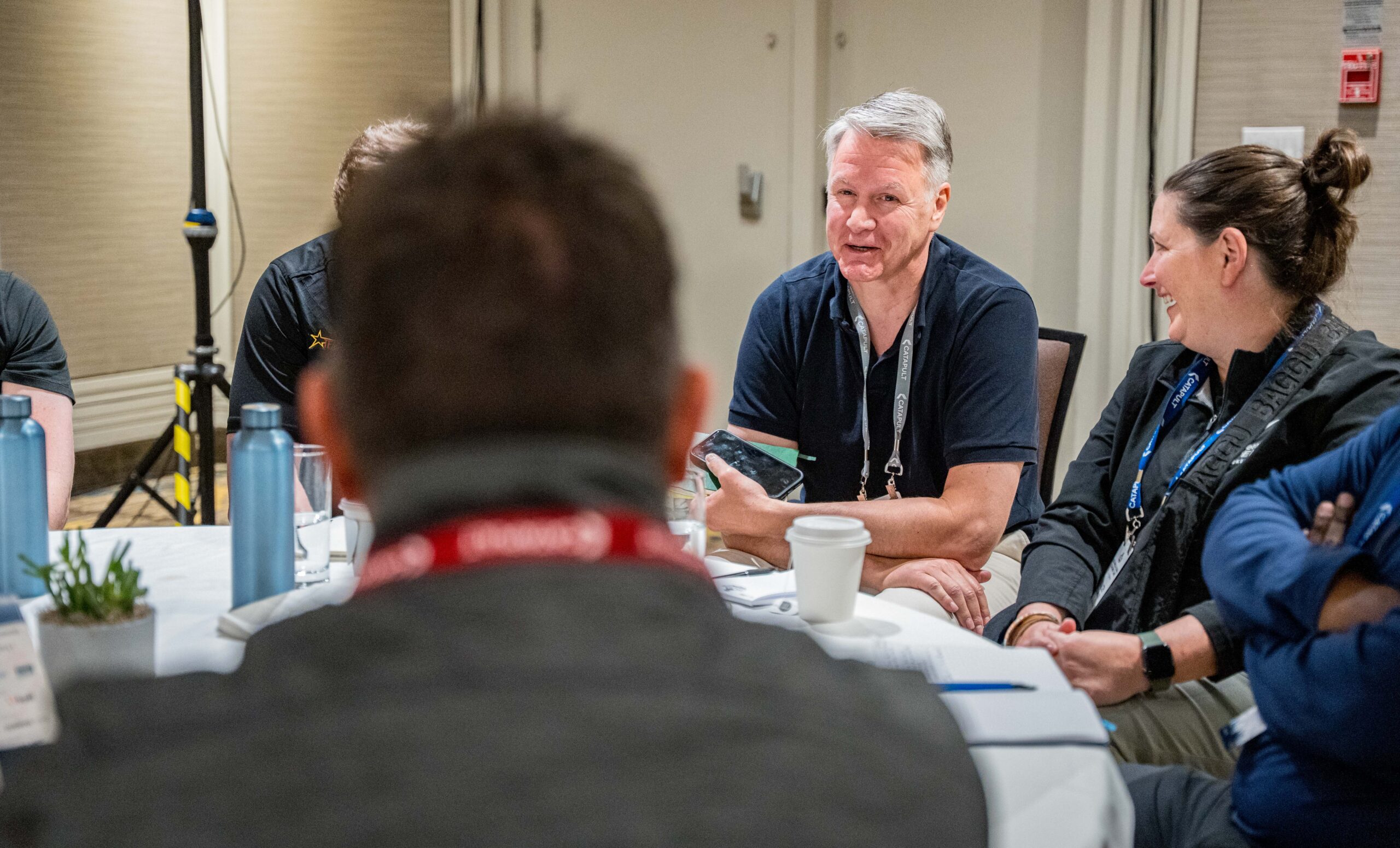
Photo: Stacey Colarossi (Right) at the 2025 NHLCA Global Coaches’ Clinic
Colarossi, who played the game like a six-footer until injuries reminded her she was 5-foot-4, has been involved with the NHLCA for the past five years and has acted as both an apt learner and mentor within the group.
“One thing I find about this space is the respect,” said Colarossi. “Gender is irrelevant,” the Georgetown, Ontario native added. “Everyone has a voice. And you can really feel from the top down that everyone’s willing to listen and take something from these events.”
Another commonality within this sprawling group is that the coaching life means commitment, and it often means confronting roadblocks and potholes. This is especially true for female and BIPOC coaches and has been a key point of focus for the NHLCA under Executive Director Lindsay Pennal.
Perry Wilson was 10 when he moved from Nova Scotia to Windsor, Ontario in 1970. He had played hockey growing up in Atlantic Canada and was related to Stan ‘Chook’ Maxwell who was, along with teammate (and Hockey Hall of Famer) Willie O’Ree, one of the first Black players to play pro hockey.
Once in Windsor, Wilson started talking to his new pals about playing hockey there.
“They went to their dads and their dads told them to tell me, ‘Black guys can’t play hockey because you can’t skate, you have weak ankles,’” Wilson recalled. “And that was the end of my hockey career as a 10-year-old. Of course, I believed it because I didn’t know any better. And I didn’t have any role models in Windsor as far as sports went.”
While he tried other sports, Wilson never forgot his love of hockey. When he graduated from high school, he started working at Chrysler in the border town long dominated by the automotive industry. Wilson’s coworkers played pick-up hockey and so he joined them, playing goal and having a blast. There were intra-company tournaments featuring high-end players. There was shinny hockey three or four nights a week. The Head Coach of the University of Windsor women’s team worked at Chrysler and, knowing Wilson was a goaltender, asked if he might have time to come out and help the Lancers’ netminders.
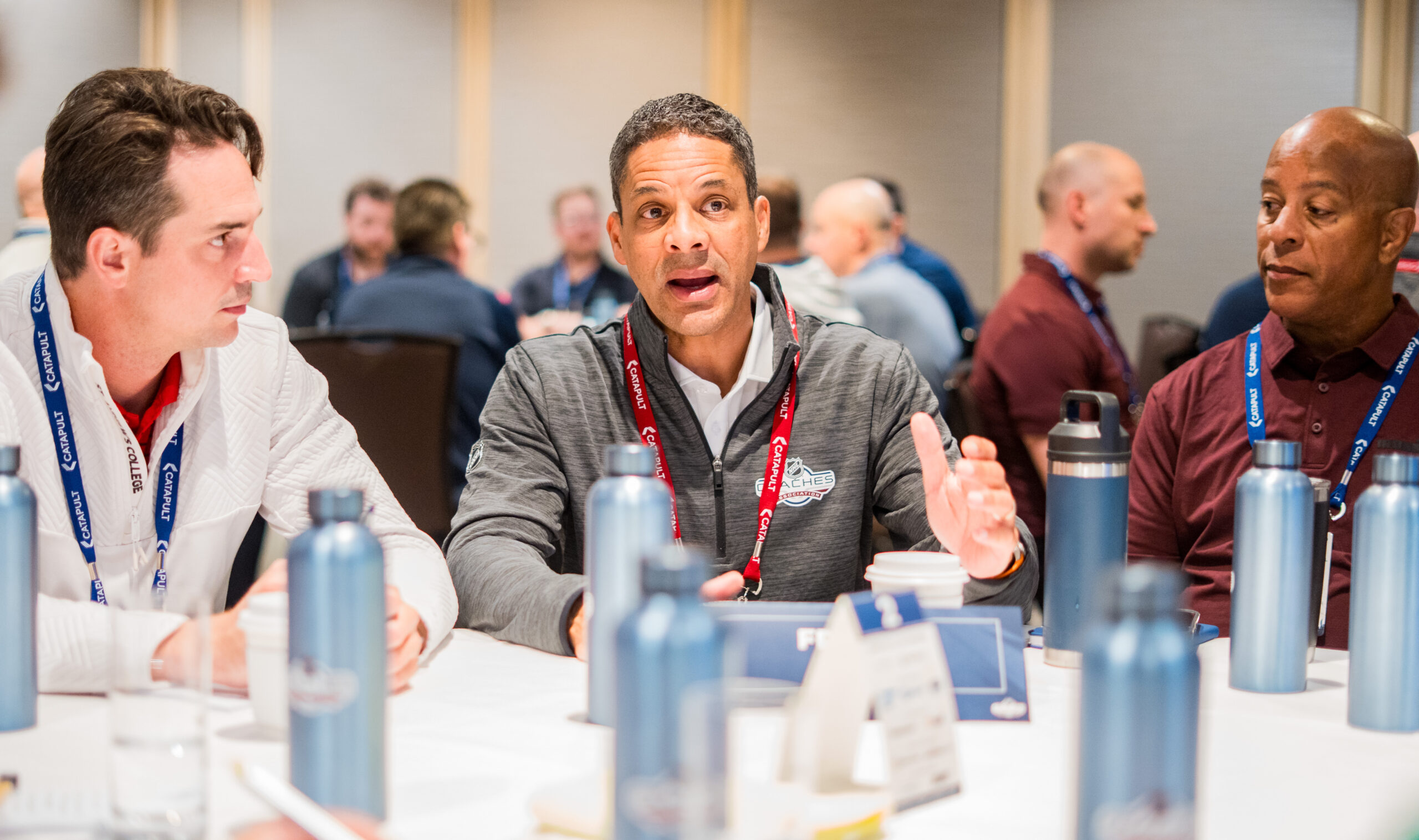
Photo: Perry Wilson (Right) and Frantz Jean (Center) at the 2025 NHLCA Global Coaches’ Clinic
Wilson ended up spending more than a decade with the team.
“It’s like, okay, I got something here,” Wilson recalled.
Over time, the business of building cars gave way to the business of building goaltenders. Wilson ended up getting an invite to Canada’s National Team development camp in Calgary, which started a long relationship with Hockey Canada and regular coaching gigs with the women’s National Team at international competitions. Those opportunities led to a spot on the staff of the hometown Windsor Spitfires of the Ontario Hockey League.
In his mid-60s now, Wilson hasn’t lost any of the drive to do more and find the next challenge. Throughout the weekend in Toronto, Wilson never appeared without a broad grin on his face and his hand shaking the hand of another attendee.
“I couldn’t have had a better weekend,” Wilson wrote in a note after the event. “I felt supported, appreciated and grateful for all the great new connections and to reconnect with all of my past relationships. To put it short. It was a fantastic weekend.”
Cathy Andrade was a professional figure skater as a teenager in Alberta. She moved to the Bay Area in Northern California with her husband in the early 1990s and has been a skating instructor since then – with a focus on hockey – for much of that time. The relationships she’s forged through her involvement with the NHLCA have been integral to confirming that the path she was charting in the coaching world was the right one for her. It started with Zoom sessions with coaches from all over the hockey world, and progressed to in-person attendance at annual gatherings like this one as well as presenting to small groups.
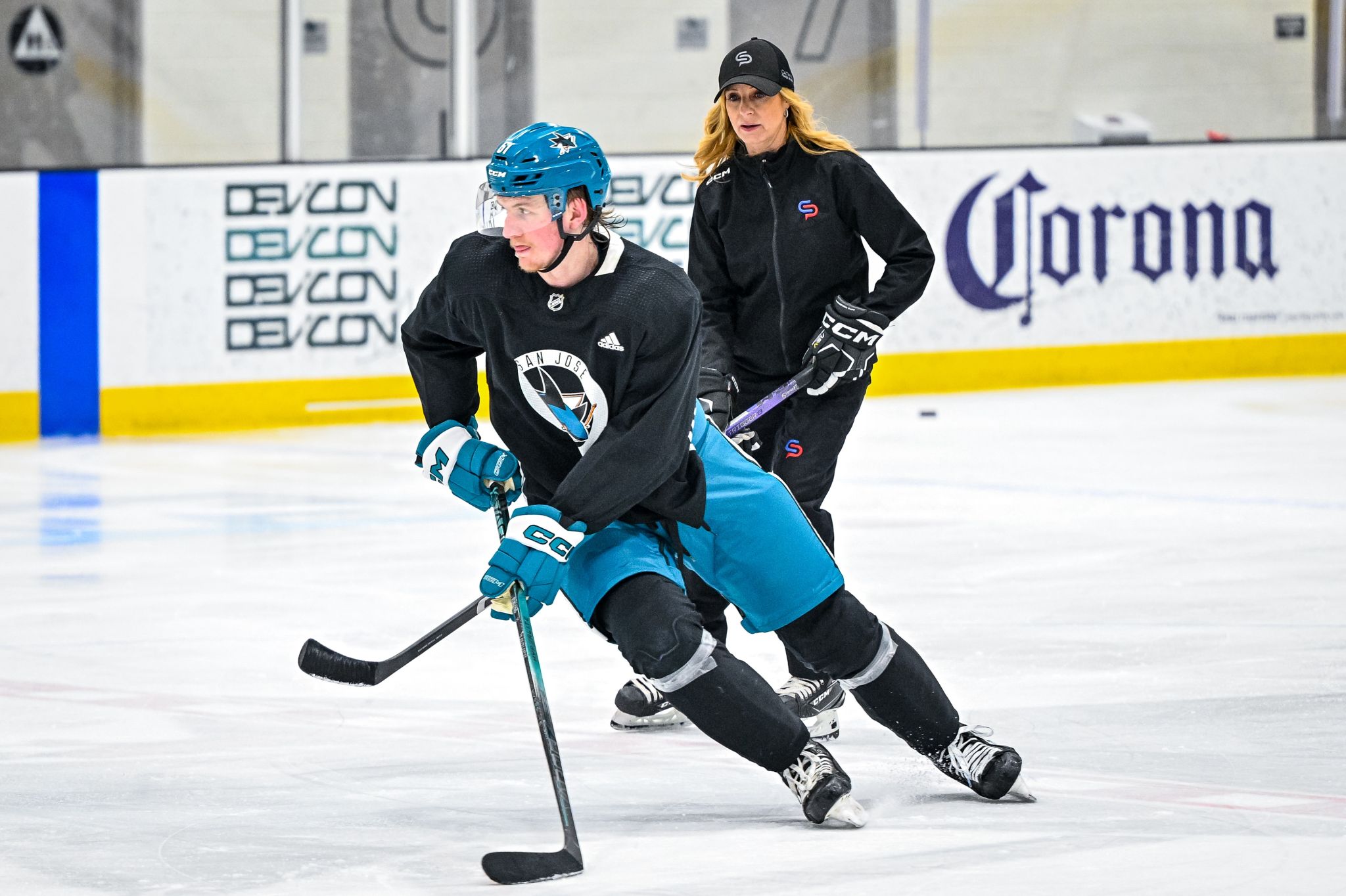
Photo: Cathy Andrade on the ice with the San Jose Sharks (© San Jose Sharks)
“It was a little bit daunting to even introduce myself and then find out all of their extensive backgrounds,” Andrade said of first interacting with the other coaches in the NHLCA’s program. “There’s just an instant comfort to be like, ‘hey, this is where I am, and this is where I want to be’, which I’d probably never really said out loud, especially to a group.”
For someone who is admittedly a private sort, those sessions have helped give Andrade’s aspirations and goals a voice even as she continues to find success, including spending last season as a skating coach with the San Jose Sharks working mostly with the team’s prospects.
“To be in this company and to be able to just talk to somebody and ask them something candidly, it’s superseded my expectations of being able to collaborate and what that really means,” Andrade said.
One of the interesting dynamics listening in on the questions asked during the small group discussions with more than three dozen current or former NHL head or assistant coaches or professional video coaches, is that there is something consistent about the process regardless of the level coaches are working at.
“It’s the same skill base, and these players, they’re trying to get to the next level, and so being able to help them achieve that next level, it’s super empowering,” Andrade said of working with young Sharks prospects.
Often the players stay after sessions, asking questions and clearly wanting to learn more. What can be more empowering for a coach and a reminder that, as a coach, you’re exactly where you’re supposed to be?
“You really realize, I have a lot to contribute,” Andrade said.
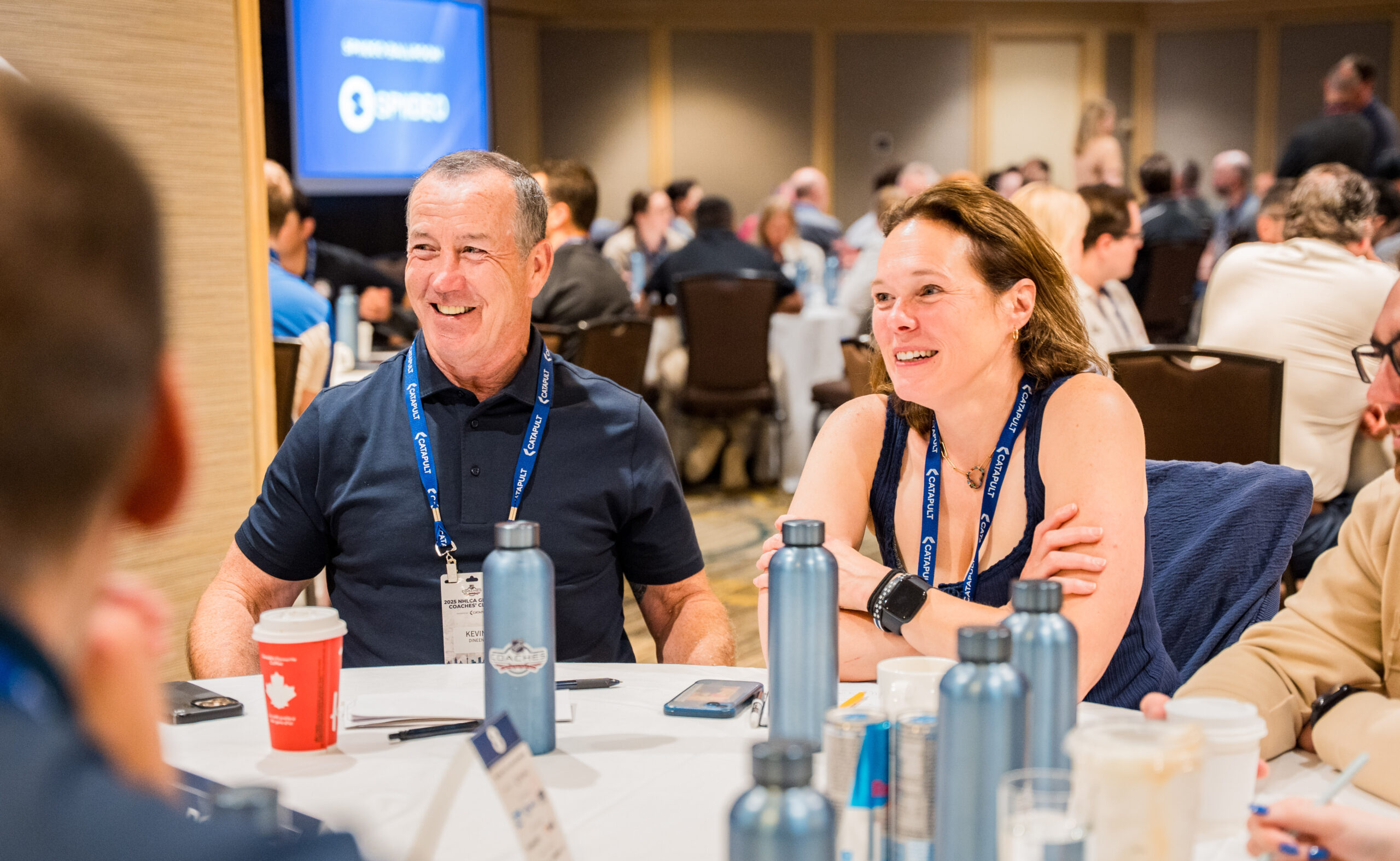
Photo: Kathryn Griswold at the 2025 NHLCA Global Coaches’ Clinic
Kathryn Griswold has been a driving force in growing women’s hockey in New York State. She likens the moments attending the NHLCA’s annual workshops and lectures as a kind of epiphany for herself and many others in attendance.
“This has been invaluable to my professional development as a coach. Just the opportunities that I have to talk to these high-level coaches, the knowledge that they have, it’s learning how to converse in their language. It’s really amazing,” Griswold said. “It’s kind of like learning French from a textbook versus being conversant in French. It really is just incredible this opportunity and at this level, at the highest level, they are all problem solvers.”
For Griswold, it’s the interplay between the coaches and the attendees that has been so gratifying and the fact the NHL coaches truly care about development and growing the game.
“These conversations, they care about my learning too,” Griswold said. “It’s just absolutely incredible and it’s so special and I’m blessed to be here. I mean, I really can’t say enough about it.”
A veteran of other NHLCA events, Griswold illustrates how the NHLCA’s educational component can have ripple effects far beyond the rink. After coaching at Rivier University with the women’s team, she is leaving that program to do some broader sport growth initiatives in China. “It’s diplomacy through sports,” Griswold said.
Claire Jenkins Coffman has been coaching since she was 16, starting at the Impact Hockey Academy when she was a junior instructor. Jenkins Coffman, fresh from a successful collegiate career at Augsburg University and the University of Maine, is now the director at the Wisconsin-based academy. She was also a part of the coaching staff with the New Hampshire Mountain Kings of the North American Hockey League and joined the Minnesota Wild as a guest coach for the second time during their development camp last month.
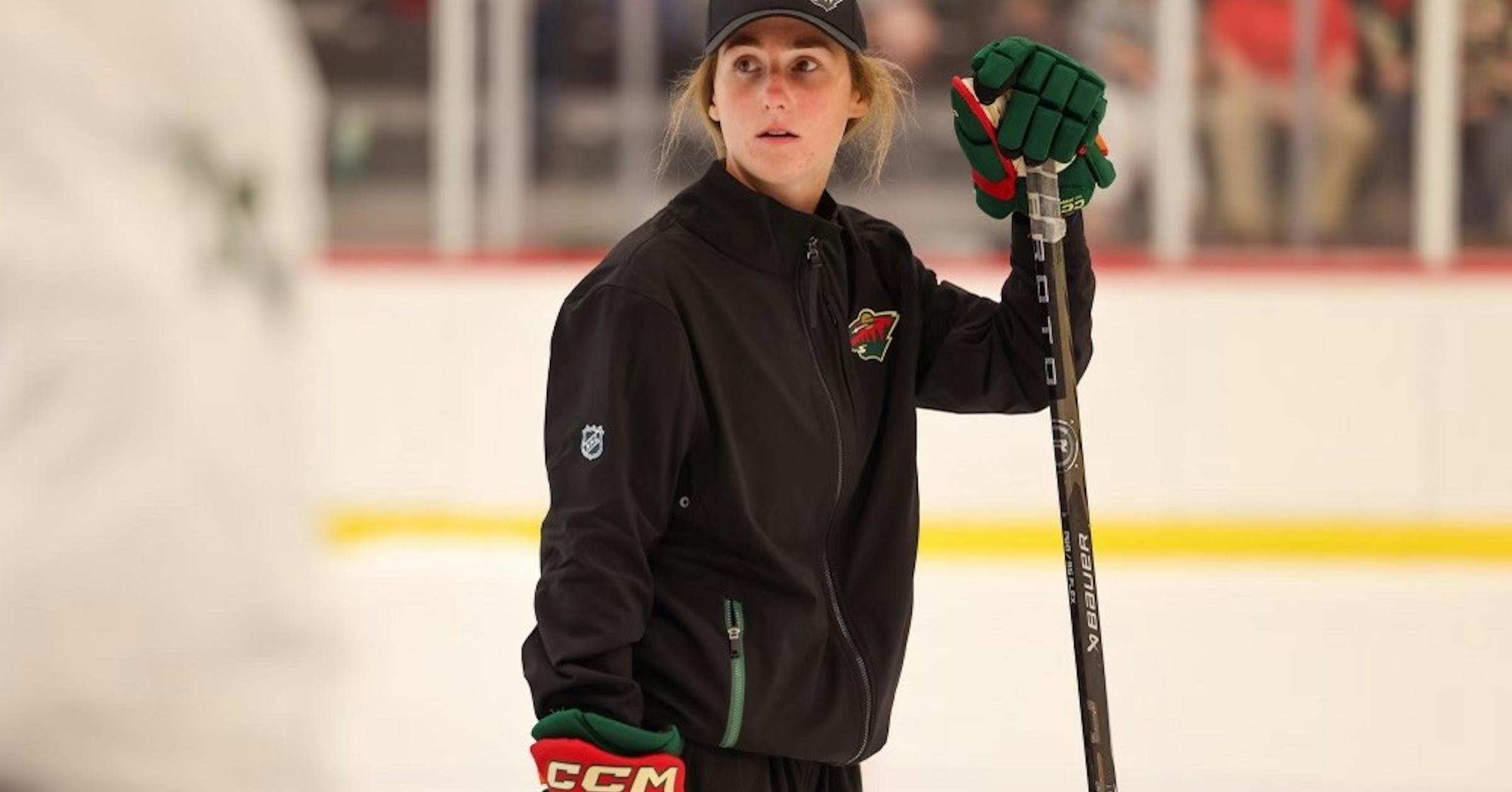
Photo: Claire Jenkins Coffman at the Minnesota Wild Development Camp in 2024 (© Minnesota Wild)
She’s been seeing it for a long time working with young players, even with her teammates at the collegiate level, but there is something intensely gratifying and motivating about helping a player take a step in their development.
“Watching the light turn on,” Jenkins Coffman said. “I was like, if I can gain the respect of my teammates and they want to watch video and they want to know my take, I can do this at the next level,” she added. “I’m one year removed from college and I still have my college teammates calling me.”
Part of the NHLCA Female Coaches Program, Jenkins Coffman attended her first annual NHLCA Clinic in Toronto with great anticipation, especially the opportunity to speak candidly with NHL coaches.
“Conversations can lead in so many different directions. You can start with skills and then end with ‘how do you enter the neutral zone?’ in just 30 minutes. So, I think that’s super cool,” Jenkins Coffman said. “Or ask questions about what’s the culture or your buy-in in your locker room? I think that’s also a super interesting thing.”
She likened the experience to apple-picking.
“It’s definitely learning and it’s a little piece of everything,” Jenkins Coffman added.
For someone who has experienced so much at such a relatively young age, one might expect it would take a lot to get Jenkins Coffman speechless. But it did happen when she met Jessica Campbell during the Toronto event. Campbell is an Assistant Coach with the Seattle Kraken and the first woman to hold a full-time bench job on an NHL coaching staff.
Campbell is also a member of the NHLCA Female Coaches Program and a vocal supporter of the Association’s mentorship efforts at expanding opportunities at the professional level that have historically been difficult to access for women and BIPOC coaches.
“I’ve met the big players; I’ve met a lot of people and I’ve never been starstruck before. But I met Jessica Campbell and I couldn’t even get myself to speak in sentences and I’m embarrassed to admit that, but with who she is, she’s groundbreaking, she’s a trailblazer and I hope to follow in her footsteps. Who doesn’t in my role?” Jenkins Coffman said.
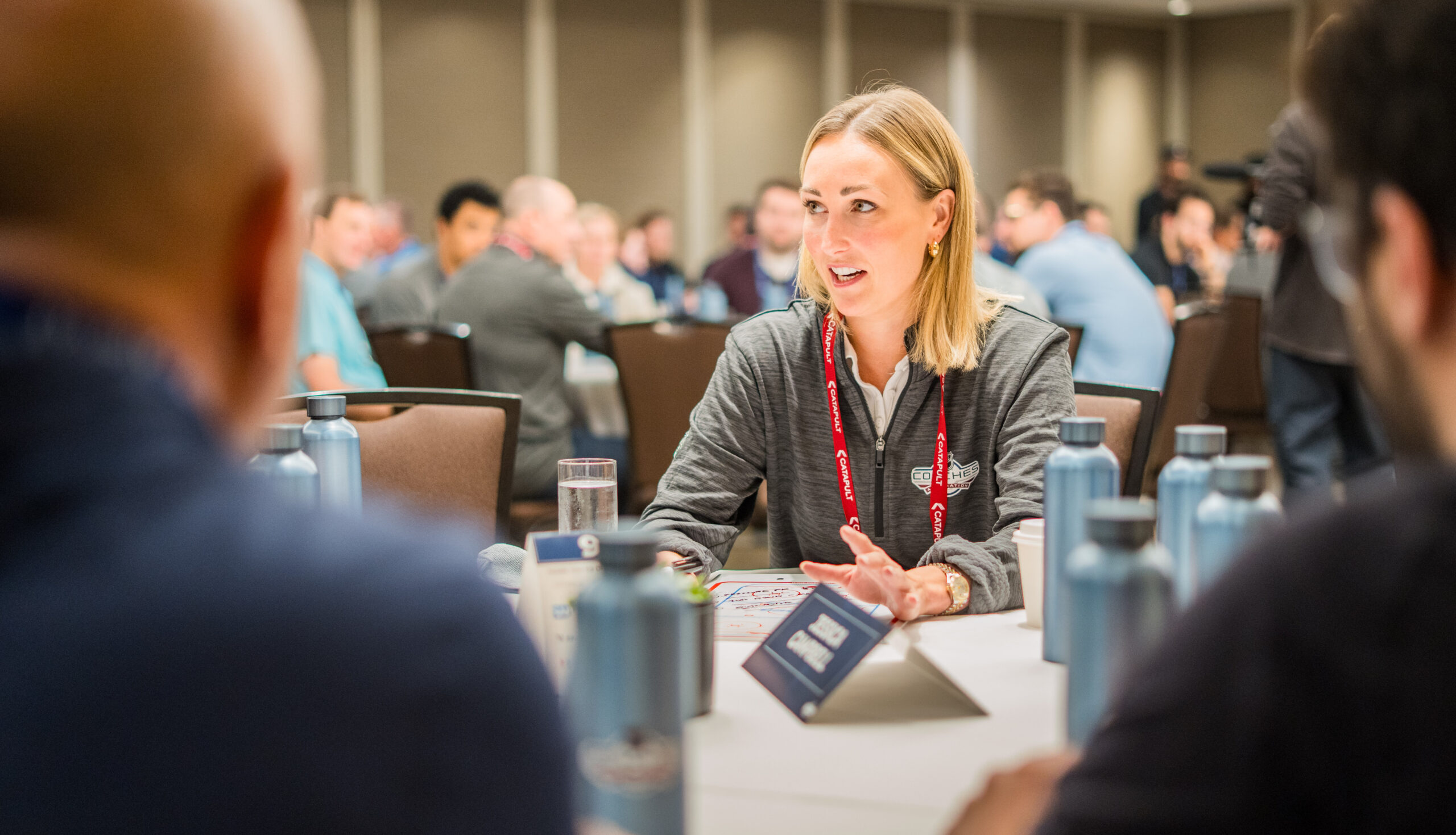
Photo: Jessica Campbell at the 2025 NHLCA Global Coaches’ Clinic
Dennis Ruppe, 27, wasn’t necessarily star struck during his first NHLCA Global Coaches’ Clinic. But the director of hockey for Hockey New Jersey was definitely all ears. His father was instrumental in setting up hockey-for-free programs in New Jersey for families who might not otherwise have had an opportunity to enjoy the game. Ruppe started helping as a volunteer coach with the youngest kids at age 12 before taking on more responsibilities during summer camps. Ruppe played some junior and college hockey before stepping in to help run the Hockey New Jersey program where he also coaches the U-14 team. He has also played internationally for Puerto Rico as they attempt to get their national hockey program off the ground.
Last year he joined the NHLCA BIPOC Coaches Program.
“I’m very much still on the hockey ops side right now, just a lot of the day-to-day planning, but I still get my little coaching fix, I’m still on the ice almost every day, so I’m in a lucky spot where it’s a little bit of a hybrid role,” Ruppe said.
“But I’ve always been interested in coaching and seeing the game from a different side and my dad probably had a big influence in that, but it’s just something that’s easy to be passionate about,” Ruppe added.
I first spoke to Nathaniel Brooks after he’d been part of the NHLCA BIPOC Coaches Program and attended the Arizona Coyotes development camp in 2021 at the invitation of GM Bill Armstrong. Brooks and Duante’ Abercrombie, now building a collegiate men’s hockey program at Tennessee State University in Nashville, were part of a documentary piece on the Guest Coach Program by noted hockey enthusiast and filmmaker, Kwame Damon Mason, entitled NHL Bound.
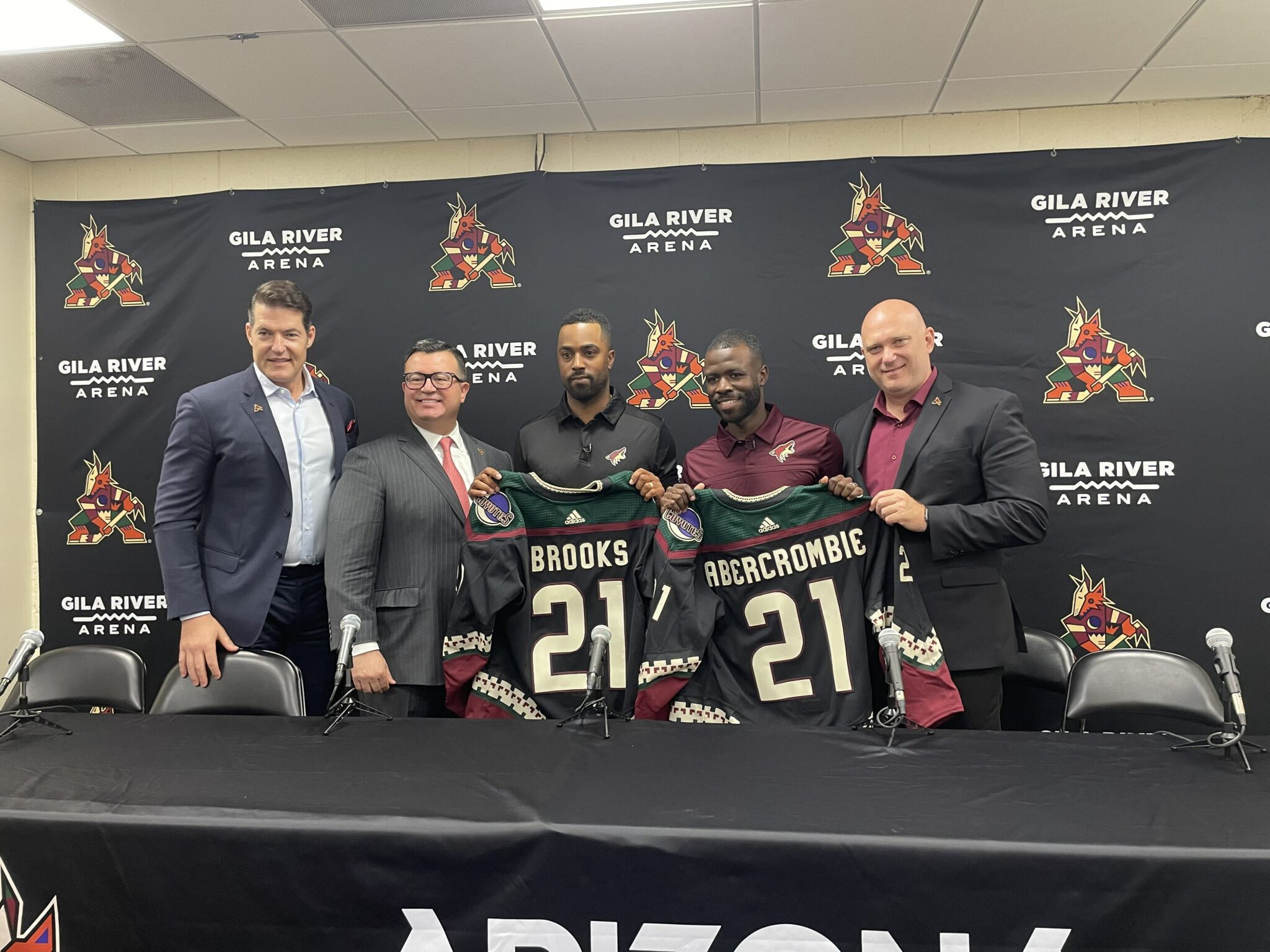
Photo: Nathaniel Brooks at the Arizona Coyotes Development Camp in 2021 (© Arizona Coyotes)
As it turns out, the title of the documentary was prophetic as Brooks is now a Player Development Coach with the Utah Mammoth.
Still, Brooks is here in Toronto soaking up the words and ideas being shared by NHL coaches during the roundtable discussions and in the informal moments between the sessions while reconnecting with old friends. In short, no resting on his laurels despite the fact he now wears an NHL team’s logo on his shirt.
“Nothing changes, I’m still coming here to learn, I’m still coming here to meet new people and get new ideas,” Brooks said.
Seeing young coaches who were like he was a few years ago, looking for an opportunity and hoping the NHLCA event might lead to a hitherto unopen door, is a reminder of his own past. It’s also a reminder it’s not about getting to the coaching finish line but about the experiences the journey provides.
“What the NHLCA does with this conference and the amount of time they put into it is so important, for one, for the growth of the game, and the growth of individuals. Because a lot of the people here are spending time with our youth. So, the more that we can be better at that level, the better we’re going to be for the game overall,” Brooks said.
“What I do now compared to what I used to do at the minor hockey level is easy,” Brooks added.
“Every experience that I’ve had has been really important to where I am now,” said Brooks, a Toronto native who coached at the Canadian University level with Ryerson University (now Toronto Metropolitan University). “I’m not someone who ever feels like I’m above anything, or I’ve learned it all, that’s just not how it is, right? So, it’s great being here, always.”
“The more we can pass down, pass down, pass down, the stronger our game will be.”
Scott Burnside is an award-winning journalist who received the Elmer Ferguson Award from the Hockey Hall of Fame in 2024. He’s covered the NHL and international hockey for over 35 years.
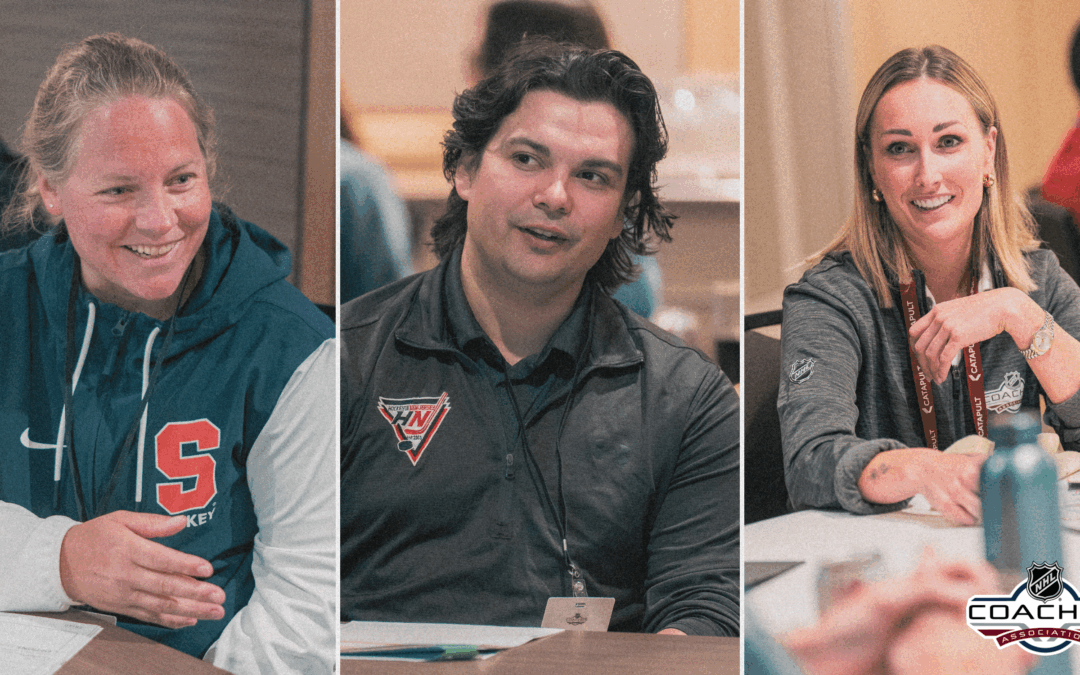
Recent Comments